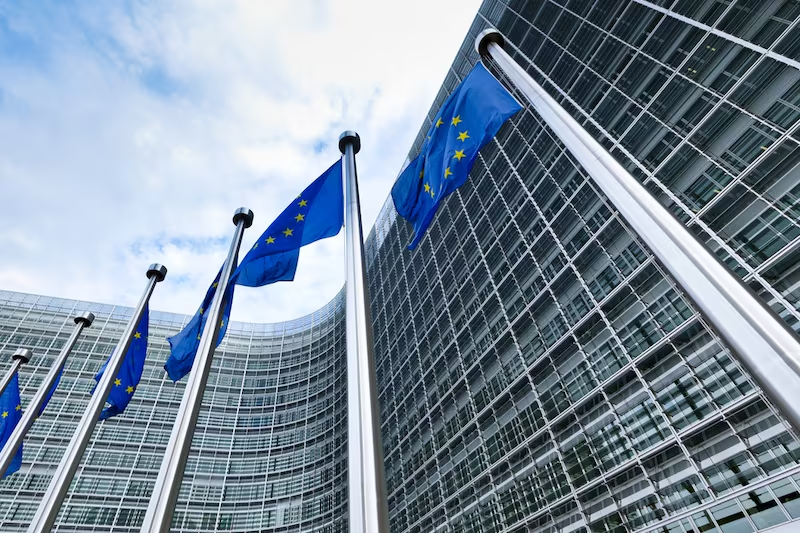Europe Warned of Incoming U.S. Protectionism: ECB Urges Preparedness to Shield Global Growth
European Central Bank (ECB) policymakers voiced concerns on Tuesday about the protectionist trade policies promised by U.S. President-elect Donald Trump, warning that they could threaten global economic growth and put Europe at risk of economic instability.
As Trump prepares to implement steep tariffs on imports, European officials are calling for a proactive response to safeguard Europe from the potential fallout.
Trump’s proposed measures include a sweeping 10% universal tariff on all imports to the U.S. and a targeted 60% tariff on Chinese goods. The policies are intended to reduce the U.S. trade deficit, but experts warn they may spark a new wave of trade tensions that could drag down the global economy.
Speaking in London, Olli Rehn, head of Finland’s central bank and a member of the ECB’s Governing Council, highlighted the risks these tariffs pose, especially amid today’s heightened geopolitical divisions. “A new trade war is the last thing we need amid today’s geopolitical rivalries – especially among allies,” Rehn remarked, emphasizing the disruptive potential of a protectionist shift from a major global player like the U.S.
Austrian central bank chief Robert Holzmann echoed Rehn’s concerns in his own remarks from Vienna, warning that the proposed U.S. policies could push both interest rates and inflation higher, with repercussions that would extend beyond U.S. borders. Holzmann suggested that if Trump’s promises materialize, the resulting policy shifts may materialize faster than markets expect.

“He means what he has said and will probably implement it faster than we expect. If so, what do markets expect? That interest rates will stay higher and that inflation will also be higher,” Holzmann said. He went on to explain that these developments would likely strengthen the U.S. dollar, putting upward pressure on prices and making it harder for the ECB to achieve its 2% inflation target.
The ECB’s call for caution is underscored by the economic frictions that surfaced during Trump’s first presidency, when Europe struggled to establish a unified response to U.S.-imposed trade barriers. This time, policymakers stress that Europe must be better prepared.
READ ALSO: Israel Misses U.S. Aid Requirements, Escalating Gaza’s Humanitarian Crisis
“If a trade war were to start, Europe must not be unprepared, as it was in 2018,” Rehn said, alluding to past missteps that limited Europe’s ability to respond effectively to trade disruptions.
The ECB is also wary of the potential impact on the euro. Holzmann suggested that a strengthened dollar, nearing parity with the euro, would drive up import costs, particularly for energy. This scenario would not only fuel inflation within the eurozone but could also lead to a rise in consumer costs, impacting households and businesses alike.
As Europe braces for potential economic headwinds, ECB leaders are emphasizing their commitment to maintaining stability across the eurozone. Rehn highlighted the ECB’s role in this evolving landscape, stressing that the central bank must serve as “an anchor for economic and financial stability in this landscape of great challenges.” He assured that the ECB would “shoulder this responsibility in full.”
By voicing these concerns and advocating for early action, the ECB is urging European leaders to adopt a unified, strategic approach to potential economic turbulence. The bank’s proactive stance aims to avoid a repeat of past unpreparedness and underscores the broader need for a coordinated response to trade threats.
As the U.S. transitions to a more protectionist economic stance, Europe faces an urgent choice. Policymakers across the continent are tasked with creating a robust economic response, one that protects European interests while minimizing disruptions to global trade.

In navigating these uncharted waters, Europe must not only ready itself for potential trade conflicts but also pursue solutions that align with the broader goals of stability and growth.
In this climate, the ECB’s message is clear: Europe must be prepared to act, equipped with a strategy that reflects both the lessons of the past and the demands of an interconnected world. Whether the anticipated policies will come to pass remains uncertain, but Europe’s ability to respond effectively may be pivotal in sustaining global economic growth amidst an era of shifting alliances and rising protectionism.
Discover more from Cine critique
Subscribe to get the latest posts sent to your email.

